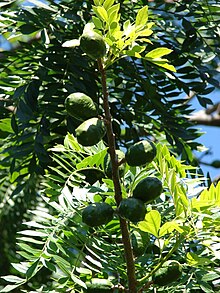Spondias is a genus of flowering plants in the cashew family, Anacardiaceae. The genus consists of 17 described species, 7 of which are native to the Neotropics and about 10 are native to tropical Asia. They are commonly named hog plums, Spanish plums, Ciruelas in Cuba, libas in Bikol and in some cases golden apples for their brightly colored fruit which resemble an apple or small plum at a casual glance. They are only distantly related to apple and plum trees, however. A more unequivocal common name is mombins.
| Spondias | |
|---|---|

| |
| Fruiting Spondias mombin | |
| Scientific classification | |
| Kingdom: | Plantae |
| Clade: | Tracheophytes |
| Clade: | Angiosperms |
| Clade: | Eudicots |
| Clade: | Rosids |
| Order: | Sapindales |
| Family: | Anacardiaceae |
| Subfamily: | Spondiadoideae |
| Genus: | Spondias L. |
| Type species | |
| Spondias mombin L. (1753)
| |
| Species | |
|
See Selected species | |
| Synonyms[1] | |
| |

A theory regarding the name of the city of Bangkok, Thailand is that the name is derived from Thai: -มะกอกน้ำ; RTGS: makok nam 'water olive', the Thai name for the fruit of Spondias dulcis.[2] In Cambodia, Spondias pinnata is called /pɷːn siː pʰlaɛ/ (ពោនស៊ីផ្លែ) or /məkaʔ prẹj/ (ម្កាក់ព្រៃ),[3] and Spondias dulcis simply /məkaʔ/ (ម្កាក់). Spondias pinnata is called Pulicha kaai in the Tamil language, which means "sour fruit." It is also called "Amate Kaai" in the Kannada language, Ambade in Tulu and Konkani. In Sri Lanka it is called Amberella. In Bangladesh it is known as Aamra (আমড়া) and when served with seasonings it is a very popular street food.
Description
editThey are deciduous or semi-evergreen trees growing to 25 m tall. The leaves are spirally arranged, pinnate, rarely bipinnate or simple. The fruit is a drupe similar to a small mango (in the related genus Mangifera), 4–10 cm long, ripening yellow or orange. It has a single seed.[citation needed]
The Malesian species of Spondias were revised by Ding Hou in 1978.[4] The most recently recognized species, Spondias testudinis, was described in 1998.[5]
As food
editAbout 10 species of Spondias bear edible fruits and have been domesticated for fruit production. These fruits are also consumed by herbivorous mammals such as deer.[citation needed]
In the Western Ghats of Karnataka flower buds and tender fruits are used in pickle preparation. In Thai cuisine both the fruits and the tender leaves are eaten. In Odisha its called ambada, the fruit is used as a souring agent in curries.[citation needed]
Selected species
editAs of January 2024[update], Plants of the World online accepts 18 species:[1]
|
|
Selected synonyms include:
- Spondias cytherea Sonn. — synonym of Spondias dulcis
- Spondias haplophylla Airy Shaw & Forman — synonym of Bouea oppositifolia (Roxb.) Meisn.
- Spondias indica (Wight & Arn.) Airy Shaw & Forman — synonym of Solenocarpus indicus Wight & Arn.
- Spondias lakonensis Pierre — synonym of Allospondias lakonensis (Pierre) Stapf
References
edit- ^ a b Spondias L. Plants of the World Online, Kew Science, retrieved 1 January 2024
- ^ "ชั้นและตำบลที่ตั้งวัด" Archived 2011-06-23 at the Wayback Machine, watarun.org, accessed March 29, 2011.
- ^ LETI, Mathieu, HUL Sovanmoly, Jean-Gabriel FOUCHÉ, CHENG Sun Kaing, Bruno DAVID, Flore photographique du Cambodge, Paris: Privat, 2013, p. 63.
- ^ Flora Malesiana series 1, 8(3):395-577.
- ^ John D. Mitchell and Douglas C. Daly. 1998. "The "tortoise's cajá" - a new species of Spondias (Anacardiaceae) from southwestern Amazonia" Brittonia 50( ):447-451.
External links
editMedia related to Spondias at Wikimedia Commons
Data related to Spondias at Wikispecies